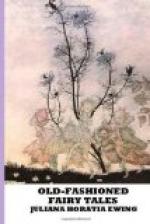As soon as his mother was in bed, the cobbler prepared for his watch. First he got together all the candles in the house, and stuck them here and there about the kitchen, and sat down to watch till they should burn blue. After waiting some time, during which the candles only guttered with the draughts, the cobbler decided to go to rest for a while. “It is too early yet,” he thought; “I shall see nothing till midnight.”
Very soon, however, he fell asleep; but towards morning he awoke, and in the dim light perceived a figure in white at his bedside. It was a blacksmith who lived near, and he had run in in his night-shirt without so much as slippers on his feet.
“The ghost at last!” thought the cobbler, and, remembering his mother’s advice, he turned over and shut his eyes.
“Neighbour! neighbour!” cried the blacksmith, “your house is on fire!”
“An old bird is not to be caught with chaff,” chuckled the cobbler to himself; and he pulled the bed-clothes over his head.
“Neighbour!” roared the blacksmith, snatching at the quilt to drag it off, “are you mad? The house is burning over your head. Get up for your life!”
“I have the courage of a general, and more,” thought the cobbler; and holding tightly on to the clothes he pretended to snore.
“If you will burn, bum!” cried the blacksmith angrily, “but I mean to save my bones”—with which he ran off.
And burnt the cobbler undoubtedly would have been, had not his mother’s cries at last convinced him that the candles had set fire to his house, which was wrapped in flames. With some difficulty he escaped with his life, but of all he possessed nothing remained to him but his tools and a few articles of furniture that the widow had saved.
As he was now again reduced to poverty, he was obliged to work as diligently as in former years, and passed the rest of his days in the same peace and prosperity which he had before enjoyed.
THE LAIRD AND THE MAN OF PEACE.
In the Highlands of Scotland there once lived a Laird of Brockburn, who would not believe in fairies. Although his sixth cousin on the mother’s side, as he returned one night from a wedding, had seen the Men of Peace hunting on the sides of Ben Muich Dhui, dressed in green, and with silver-mounted bridles to their horses which jingled as they rode; and though Rory the fiddler having gone to play at a christening did never come home, but crossing a hill near Brockburn in a mist was seduced into a Shian[1] or fairy turret, where, as all decent bodies well believe, he is playing still—in spite, I say, of the wise saws and experience of all his neighbours, Brockburn remained obstinately incredulous.
[Footnote 1: Shian, a Gaelic name for fairy towers, which by day are not to be told from mountain crags.]
Not that he bore any ill-will to the Good People, or spoke uncivilly of them; indeed he always disavowed any feeling of disrespect towards them if they existed, saying that he was a man of peace himself, and anxious to live peaceably with whatever neighbours he had, but that till he had seen one of the Daoine Shi[2] he could not believe in them.




